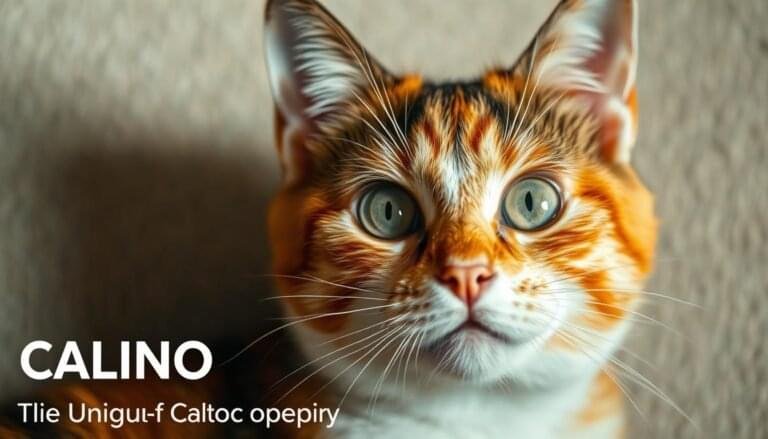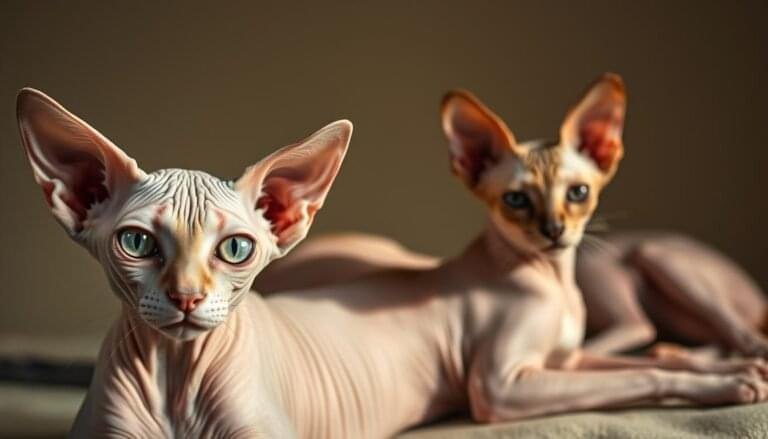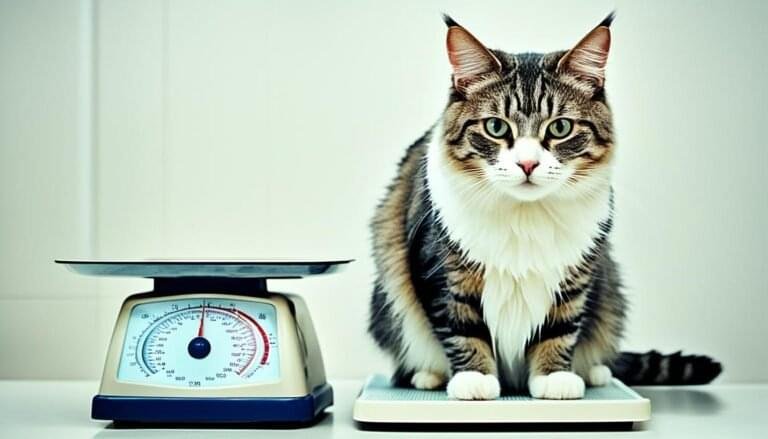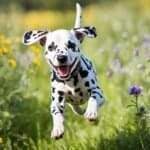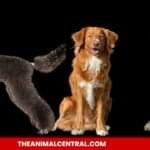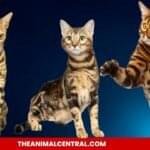Did you know that the Maine Coon cat is known for its impressive lifespan? These gentle giants can live on average for 12 to 15 years, but many have been known to live even longer with the right care. Factors such as genetics, diet, exercise, environment, and healthcare all play a role in determining how long your beloved Maine Coon will be your furry companion.
Key Takeaways:
- Maine Coon cats have an average lifespan of 12 to 15 years.
- Proper care and attention can help extend a Maine Coon’s life expectancy.
- Factors such as genetics, diet, exercise, environment, and healthcare influence a Maine Coon’s lifespan.
- Regular veterinary check-ups and preventive healthcare are essential for a long and healthy life.
- Understanding and addressing the unique needs of Maine Coons can help maximize their lifespan.
What is the Life Expectancy of a Maine Coon Cat?
When bringing a Maine Coon into your life, it’s natural to wonder about their lifespan. According to veterinarians and feline experts, most Maine Coon cats live for about 13 to 15 years. However, there have been exceptional cases of Maine Coons living well beyond 20 years, with the oldest known Maine Coon reaching an impressive 31 years of age.
While the exact lifespan can vary, factors such as genetics, diet, exercise, environment, and healthcare can all contribute to a Maine Coon’s longevity. By providing the proper care and attention throughout their lives, you can help extend your Maine Coon’s life expectancy.
Factors Affecting Maine Coon Lifespan
The Maine Coon is generally a healthy and resilient breed, but several factors can influence their lifespan. Let’s take a closer look at these key factors:
- Genetics: While genetics play a role in a Maine Coon’s lifespan, it is not the sole determining factor. Knowing the complete history of your cat’s bloodline can provide valuable insights into potential health conditions they may be predisposed to.
- Diet: Providing a balanced and nutritious diet is essential for maintaining your Maine Coon’s overall health. A diet rich in high-quality cat food that includes lean meat, fish, and essential nutrients can help prevent obesity-related health issues and promote longevity.
- Exercise: Regular physical activity is crucial for keeping your Maine Coon in optimal health. Engaging them in play sessions and providing opportunities for exercise can help maintain their muscle tone, prevent weight gain, and promote a healthy heart.
- Environment: Creating a safe and stimulating environment for your Maine Coon is vital. Keeping them indoors protects them from potential dangers such as accidents, exposure to toxins, and diseases transmitted by other animals. A secure outdoor space or supervised outdoor adventures can provide a taste of the outdoors while ensuring their safety.
- Healthcare: Regular veterinary check-ups, preventive care, and prompt attention to any health concerns are essential for maximizing your Maine Coon’s lifespan. By staying proactive and addressing potential health issues early on, you can help your cat lead a long and healthy life.
By considering these factors and providing the necessary care and attention, you can contribute to extending the life expectancy of your Maine Coon and enjoy many happy years together.
Maine Coon Life Stages
Maine Coons go through distinct life stages that contribute to their overall lifespan. Understanding these stages can help you provide appropriate care and make the most of your time with your furry companion. Let’s explore the different life stages of Maine Coon cats:
1. Infancy (0 – 13 weeks)
This stage marks the beginning of a Maine Coon’s life. During this period, they are most vulnerable and rely on their mother for nourishment and protection. They start exploring their surroundings, develop basic motor skills, and begin socializing with their littermates.
2. Kittenhood (13 weeks – 12 months)
As Maine Coons enter their kittenhood stage, their curiosity and playfulness increase. They continue to grow rapidly, both physically and mentally. This is the time when they start learning hunting skills, grooming habits, and basic behaviors through their interactions with their environment and humans.
3. Junior Period (1 – 3 years)
The junior period is a critical stage for Maine Coons’ development. They become more independent and reach adolescence. Physically, their body proportions start to take shape, and their energy levels remain high. Mentally, they further refine their hunting skills and establish their personalities.
4. Prime Phase (2 – 6 years)
During the prime phase, Maine Coons reach their peak physical form and temperament. They are fully matured and exhibit the characteristic large size, strong muscles, and luxurious coat. This stage is when they are most active and playful, balancing their energy with moments of relaxation.
5. Mature Phase (7 – 10 years)
In the mature phase, Maine Coons start to show signs of aging. While they are still active and healthy, they may begin to experience minor physical changes. Their metabolism may slow down, and their fur may start to lose some of its luster. However, with proper care, they can continue to enjoy a good quality of life.
6. Senior Stage (10+ years)
The senior stage is when Maine Coons require extra care and attention due to age-related changes. They may become less active, experience joint stiffness, and develop age-related health issues. Regular veterinary check-ups, a balanced diet, and a comfortable environment can help ensure their well-being during this stage.
To better visualize the different life stages of Maine Coons, here is a table summarizing the key characteristics of each stage:
| Life Stage | Age | Physical Development | Mental Development |
|---|---|---|---|
| Infancy | 0 – 13 weeks | Basic motor skills development | Initial socialization and exploration |
| Kittenhood | 13 weeks – 12 months | Rapid growth and development | Learning hunting skills and behaviors |
| Junior Period | 1 – 3 years | Physical maturation | Further refinement of hunting skills and behaviors |
| Prime Phase | 2 – 6 years | Peak physical form | Playfulness and balanced temperament |
| Mature Phase | 7 – 10 years | Minor physical changes | Mental and physical well-being |
| Senior Stage | 10+ years | Aging-related changes | Extra care and attention needed |
Factors Influencing Maine Coon Lifespan
Several factors can influence the lifespan of a Maine Coon. Let’s explore the key factors that can affect your Maine Coon’s longevity:
1. Genetic Predisposition
Genetics can play a role in determining a Maine Coon’s lifespan. While certain genetic traits may predispose them to certain health conditions, it’s important to note that modern veterinary care and proper care can help mitigate these potential issues.
2. Diet and Nutrition
Diet plays a crucial role in a Maine Coon’s overall health and lifespan. Feeding your Maine Coon a high-quality cat food that is rich in essential nutrients and animal protein can help maintain a healthy weight and prevent obesity-related health problems. It’s important to practice proper portion control to ensure your Maine Coon is getting the right amount of food.
3. Physical Activity and Mental Stimulation
Engaging your Maine Coon in regular physical activity and providing mental stimulation are important for their well-being. Especially during the kittenhood and prime phases, adequate exercise and playtime help maintain muscle tone and prevent boredom-related behaviors.
4. Environment
The environment in which your Maine Coon lives can significantly impact their lifespan. Keeping them indoors helps protect them from potential dangers such as accidents, exposure to infectious diseases, and encounters with predators or harmful substances. Creating a safe and stimulating indoor environment contributes to their overall safety and well-being.
5. Regular Veterinary Care
Regular veterinary check-ups and preventive healthcare are essential for identifying and addressing potential health issues before they become serious. Routine vaccinations, parasite prevention, dental care, and early disease detection can all contribute to a longer and healthier life for your Maine Coon.
The table below summarizes the key factors affecting Maine Coon lifespan and provides tips for maximizing their health and longevity:
| Factors | Maine Coon Health Tips |
|---|---|
| Genetic Predisposition | Regular veterinary care and proper care can help mitigate potential health issues. |
| Diet and Nutrition | Provide high-quality cat food and practice proper portion control to maintain a healthy weight. |
| Physical Activity and Mental Stimulation | Engage your Maine Coon in regular exercise and provide stimulating playtime and toys. |
| Environment | Keep your Maine Coon indoors to protect them from potential dangers and provide a safe and stimulating environment. |
| Regular Veterinary Care | Schedule routine check-ups and vaccinations, and address potential health issues promptly. |
By considering and addressing these factors, you can help ensure that your Maine Coon leads a healthy and happy life for many years to come.
The Perfect Diet for Your Maine Coon
Proper nutrition plays a vital role in maximizing the lifespan of your Maine Coon. As obligate carnivores, Maine Coons require a diet rich in animal protein to thrive. It is important to choose high-quality cat food that contains lean meat, fish, and essential nutrients.
Image:
When selecting cat food for your Maine Coon, it is crucial to avoid filler ingredients, allergens, and other harmful substances that can negatively impact their health. Look for brands that prioritize the nutritional needs of Maine Coons and exclude artificial additives and preservatives.
Portion control is also essential to prevent overfeeding and obesity, which can lead to a shorter lifespan and various health issues. Follow the feeding guidelines provided by the cat food manufacturer and consult your veterinarian for personalized recommendations based on your Maine Coon’s age, weight, and activity level.
Table: Recommended Nutrients for a Maine Coon’s Diet
| Nutrient | Importance | Sources |
|---|---|---|
| Animal Protein | Essential for growth, muscle development, and overall health | Chicken, turkey, fish |
| Taurine | Supports heart health and vision | Meat, seafood |
| Omega-3 Fatty Acids | Promotes a healthy coat, skin, and joints | Fish oil, flaxseed |
| Vitamins and Minerals | Aids in immune function and overall well-being | Fruits, vegetables, supplements |
Remember: While diet is a critical factor in your Maine Coon’s health, it should be complemented with regular exercise, a safe environment, and routine veterinary care. By providing a balanced and nutritious diet, you can help your Maine Coon maintain optimal health and enjoy a long and happy life.
Importance of Physical Activity and Mental Stimulation
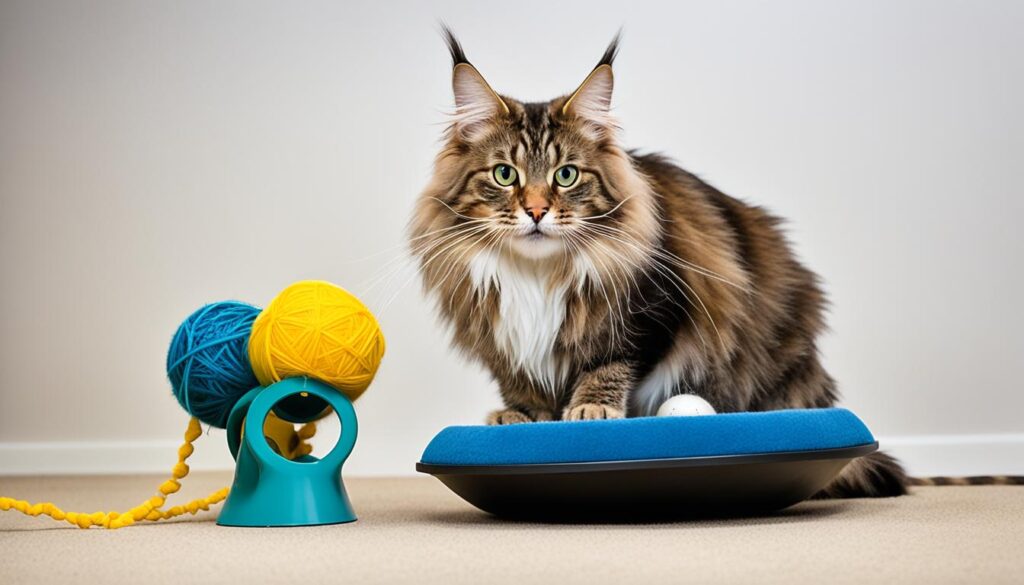
Playtime and exercise are crucial for a Maine Coon’s physical and mental well-being. Kittens have high energy levels and need plenty of playtime to develop properly. Even as they mature, Maine Coons benefit from regular physical activity to maintain their muscle tone and overall health.
Providing a variety of toys, interactive play sessions, and suitable exercises tailored to their life stage can keep them engaged and stimulated. Mental stimulation is just as important, with new toys, different play environments, and post-exercise treats helping to keep their minds active and healthy.
Engaging in regular play and exercise with your Maine Coon can have several benefits:
- Physical fitness: Running, jumping, and playing help Maine Coons stay fit and agile, preventing obesity and related health problems.
- Muscle tone: Physical activity helps maintain strong muscles, resulting in a healthy and well-proportioned physique.
- Energy release: Playtime allows Maine Coons to release pent-up energy, reducing the likelihood of destructive behaviors.
- Mental stimulation: Offering a variety of toys, puzzles, and interactive play sessions keeps their minds sharp and engaged.
- Bonding: Participating in play strengthens the bond between you and your Maine Coon, enhancing your relationship.
When it comes to exercise, it is essential to consider your Maine Coon’s life stage and individual needs. Here are some exercise ideas for different stages:
| Life Stage | Exercise |
|---|---|
| Kittenhood | Interactive toys, gentle chasing games, climbing structures |
| Junior to Prime Stage | Active play sessions, puzzle toys, obstacle courses |
| Mature to Senior Stage | Gentle exercises, short play sessions, low-impact activities |
Remember to observe your Maine Coon’s energy levels, preferences, and any physical limitations. Always provide a safe and stimulating environment for play and monitor for signs of exhaustion or overexertion.
Nurturing Mental Stimulation
In addition to physical exercise, mental stimulation is vital for a Maine Coon’s overall well-being. Try incorporating the following activities into their routine:
- Puzzle toys: Provide interactive toys that require problem-solving and encourage independent play.
- Hide-and-seek: Hide treats or toys around the house for your Maine Coon to search for.
- Clicker training: Teach your Maine Coon basic commands and tricks using positive reinforcement.
- Rotating toys: Introduce new toys regularly to keep your Maine Coon engaged and curious.
- Environmental enrichment: Create different play zones in your home with scratching posts, climbing trees, and cozy hiding spots.
By offering a combination of physical activity and mental stimulation, you can help ensure that your Maine Coon thrives both physically and mentally.
Creating a Safe Environment for Your Maine Coon
Creating a safe environment is essential for maximizing a Maine Coon’s lifespan. While they may have a strong urge to explore, keeping them indoors can protect them from potential dangers such as injuries, getting lost, poisoning, and illnesses. Maine Coons are natural hunters, and allowing them to roam freely can lead to digestive issues and exposure to contaminants.
If you’re concerned about restricting their freedom, supervised outdoor adventures and providing a secure outdoor space can be a compromise for Maine Coons that need a taste of the outdoors while still ensuring their safety. This way, you can monitor their activities and protect them from potential hazards.
Indoor Enrichment Ideas
- Provide scratching posts and climbing trees to satisfy their natural urge to climb and scratch.
- Offer interactive toys and puzzle feeders to keep them mentally stimulated.
- Create cozy hiding spots with beds or blankets for them to relax and retreat.
- Set up window perches or bird feeders outside to provide entertainment and mimic natural sights and sounds.
| Dangers of Outdoor Roaming | Benefits of Indoor Living |
|---|---|
| Increased risk of accidents, such as traffic accidents and injuries from other animals | Protection from external dangers and reduced risk of injuries and accidents |
| Potential exposure to diseases, parasites, and toxins | Reduced risk of contracting diseases and parasite infestations |
| Increased likelihood of getting lost or stolen | Peace of mind knowing your Maine Coon is always safe at home |
| Predation on wildlife and disruption of local ecosystems | Reduced impact on local wildlife and ecosystems |
Importance of Healthcare for Maine Coons
Regular veterinary check-ups are crucial for maintaining a Maine Coon’s health and lifespan. Routine visits to the vet can help identify any potential health issues early on and ensure appropriate preventive care. Maine Coons are more prone to certain conditions such as hip dysplasia, hypertrophic cardiomyopathy, spinal muscular atrophy, periodontal disease, and polycystic kidney disease. By staying proactive with healthcare and addressing any concerns promptly, you can help your Maine Coon live a long and healthy life.
Common Health Issues in Maine Coons
Maine Coon cats, like any other breed, are susceptible to certain health issues. Being aware of these conditions can help you provide the necessary care and take proactive measures for prevention and treatment. Below is a table summarizing some of the common health issues that Maine Coons may experience:
| Health Condition | Description | Prevention/Treatment |
|---|---|---|
| Hip Dysplasia | A malformation of the hip joint that can cause pain and mobility issues. | Regular veterinary check-ups, exercise, and maintaining a healthy weight. |
| Hypertrophic Cardiomyopathy | A condition where the heart muscle becomes thickened, leading to heart problems. | Regular veterinary check-ups and screenings, a heart-healthy diet, and medication if necessary. |
| Spinal Muscular Atrophy | A genetic disorder that affects the muscles, leading to weakness and difficulty in movement. | Genetic testing and careful breeding to avoid passing on the gene, physical therapy, and supportive care. |
| Periodontal Disease | An infection of the gums and surrounding tissues that can result in tooth loss and other oral health problems. | Regular dental care, including brushing your Maine Coon’s teeth, providing dental treats, and professional cleanings. |
| Polycystic Kidney Disease | A hereditary condition where cysts form in the kidneys, leading to kidney dysfunction. | Genetic testing to identify carriers, monitoring kidney health through regular check-ups and blood tests, and supportive care for affected cats. |
While genetic predisposition plays a role in these health conditions, routine veterinary care and proactive measures can help alleviate their impact and ensure a better quality of life for your Maine Coon. Early detection, proper treatment, and strategic preventive measures will go a long way in keeping your feline companion healthy and happy.
The Best Care for Your Senior Maine Coon
As Maine Coons enter their senior stage, they require special care and attention. Their agility may decrease, and they may experience changes in their fur, dental health, and overall sensitivity. Providing a comfortable and safe environment, monitoring their health closely, and maintaining regular veterinary check-ups become even more crucial during this stage. Adjusting their diet, providing proper hydration, considering heated cat beds, and addressing any age-related health concerns promptly can help senior Maine Coons live their best lives in their golden years.
When it comes to caring for senior Maine Coons, a holistic approach is key. Here are some important aspects to consider:
1. Diet and Nutrition
Proper nutrition is essential for senior Maine Coons. As they age, their dietary requirements may change. It’s important to adjust their diet to support their changing needs. Consult with your veterinarian to determine the best diet plan, which may include senior cat food formulas that are specifically formulated for older cats.
2. Hydration
Senior Maine Coons may have a decreased thirst drive, making them prone to dehydration. Encourage proper hydration by providing fresh water sources throughout the house and considering a cat water fountain, which can entice them to drink more.
3. Comfortable and Safe Environment
Creating a comfortable and safe environment for your senior Maine Coon is vital. Provide them with a soft and cozy bed that offers support for their aging joints. Consider heated cat beds to keep them warm and comfortable during colder months.
4. Regular Veterinary Check-ups
With age, Maine Coons may be more prone to certain health conditions. Maintaining regular veterinary check-ups allows for early detection and treatment of potential health issues. Your veterinarian can perform comprehensive exams, including bloodwork and screenings, to monitor your senior cat’s health.
5. Dental Care
Oral health is essential for senior cats, as dental problems can lead to other health issues. Regularly brush your senior Maine Coon’s teeth, provide dental treats, or consider professional dental cleanings as recommended by your veterinarian.
6. Exercise and Mental Stimulation
While senior Maine Coons may not be as active as their younger selves, regular exercise and mental stimulation are still important. Engage in gentle play sessions with interactive toys and provide scratching posts or climbing trees to keep them physically and mentally stimulated.
7. Joint and Mobility Support
As Maine Coons age, they may develop joint issues and mobility challenges. Consult with your veterinarian about joint supplements or medications that can help support their mobility and alleviate any discomfort.
| Senior Maine Coon Care Checklist |
|---|
| Adjust diet to meet changing nutritional needs |
| Ensure proper hydration |
| Create a comfortable and safe environment |
| Maintain regular veterinary check-ups |
| Provide dental care |
| Engage in regular exercise and mental stimulation |
| Support joint and mobility health |
The Role of Genetic Predisposition in Maine Coon Lifespan
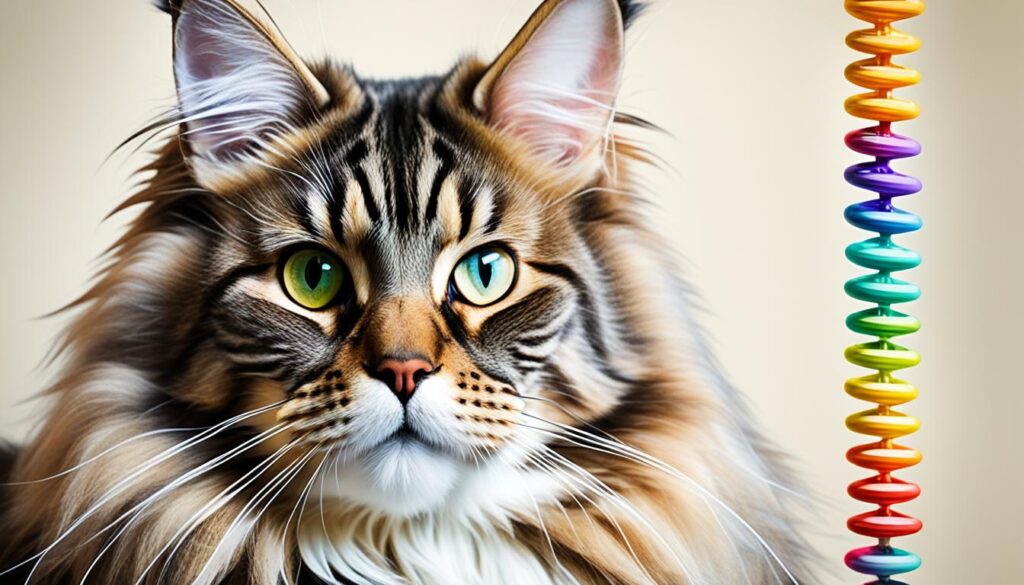
Genetic predisposition is a factor that can influence the lifespan of Maine Coon cats, although it is not the sole determining factor. Understanding the complete history of your cat’s bloodline can provide valuable insight into potential health issues they may be predisposed to. It is important to note, however, that modern veterinary medicine and proper care can help mitigate genetic health concerns.
Regular veterinary check-ups are essential for monitoring and addressing any potential genetic health issues. Through these check-ups, veterinarians can detect and treat conditions early on, improving outcomes and extending your Maine Coon’s lifespan.
Additionally, providing a balanced diet is crucial for the overall health of your Maine Coon, including managing potential genetic health issues. A high-quality cat food that meets their specific nutritional needs can help support their immune system and promote overall well-being.
Exercise also plays a vital role in maintaining a healthy Maine Coon. Regular physical activity helps keep their muscles toned, prevents obesity, and promotes cardiovascular health. Interactive play sessions, puzzle toys, and cat trees can help stimulate your Maine Coon both mentally and physically.
Creating a safe and stress-free environment for your Maine Coon is essential for addressing potential genetic health issues. Providing a comfortable and stimulating environment can minimize stress and its detrimental effects on their health. Cat-proofing your home, providing hiding places, and ensuring a secure outdoor space, if applicable, are all important considerations.
Genetic Health Issues in Maine Coons
| Health Issue | Description | Treatment/Prevention |
|---|---|---|
| Hip Dysplasia | A condition where the hip joint doesn’t develop properly, leading to joint instability and arthritis. | Weight management, physical therapy, pain management |
| Hypertrophic Cardiomyopathy | A heart disease characterized by thickening of the heart muscle. | Regular vet check-ups, medication, diet modification |
| Spinal Muscular Atrophy | A genetic disorder that affects muscle control and movement in Maine Coons. | No cure; supportive care to manage symptoms |
| Periodontal Disease | An inflammatory condition affecting the gums and teeth. | Daily dental care, professional cleanings, diet modification |
| Polycystic Kidney Disease | A hereditary condition where cysts form in the kidneys, affecting their function. | Regular vet check-ups, special diet, supportive care |
By taking proactive measures to address potential genetic health issues, you can help ensure a long and healthy life for your beloved Maine Coon.
Grooming and Hygiene for Maine Coons
Proper grooming and hygiene practices are essential for maintaining the health and well-being of your Maine Coon. Their long, thick fur requires regular brushing or combing to prevent matting and tangling. Not only does this help keep their coat clean and free of debris, but it also promotes healthy skin and reduces the risk of skin infections.
In the spring and summer months, Maine Coons tend to shed their winter coat. Daily grooming during this time can help remove excess fur and prevent it from accumulating in your home. It’s also a good opportunity to check for any signs of skin irritation or parasites, such as fleas or ticks, and address them promptly.
Trimming your Maine Coon’s nails is another important aspect of grooming. Regular nail trims help prevent overgrowth and discomfort, particularly if your cat is mainly indoors and doesn’t have the opportunity to naturally wear down their nails. Remember to use cat-specific nail clippers and be cautious not to trim too close to the quick, as it can be painful for your cat.
Dental hygiene is crucial for your Maine Coon’s overall health. Periodontal disease is common in cats, and regular dental care can prevent tooth decay, gum infections, and other dental problems. Brushing your cat’s teeth regularly, using a cat-friendly toothbrush and toothpaste, can help maintain good oral hygiene. Additionally, providing dental treats or toys specifically designed for dental care can help keep your Maine Coon’s teeth clean and healthy.
Regular veterinary cleanings are also an essential part of maintaining your Maine Coon’s hygiene and overall health. Your veterinarian can perform a thorough examination of your cat’s teeth, ears, and skin, and address any specific grooming or hygiene concerns. They can also provide professional grooming services if needed, such as trimming the hair around your cat’s bottom to prevent fecal matting.
By prioritizing grooming and hygiene practices for your Maine Coon, you not only keep them clean and comfortable, but you also contribute to their overall health and well-being. Regular grooming sessions can also serve as a bonding time between you and your cat, strengthening your relationship and promoting trust.
Grooming and Hygiene Tips for Maine Coons:
- Brush or comb your Maine Coon’s fur regularly to prevent matting and tangling.
- During shedding seasons, such as spring and summer, consider daily grooming sessions to manage excess fur.
- Trim your cat’s nails regularly to prevent overgrowth and discomfort.
- Take care of your Maine Coon’s dental hygiene by brushing their teeth regularly and providing dental treats or toys.
- Schedule regular veterinary cleanings to ensure thorough examination and professional grooming if needed.
Conclusion
Maximizing the lifespan of your Maine Coon involves a combination of factors, including proper care, a balanced diet, physical activity, a safe environment, and regular veterinary care. By understanding the unique needs and characteristics of Maine Coons, you can provide the best possible care for your furry companion and ensure they have a long and healthy life by your side.
To maximize your Maine Coon’s lifespan, it’s important to prioritize their well-being. Start by providing regular veterinary check-ups to catch any potential health issues early on. A nutritious diet tailored to their specific needs, such as high-quality cat food rich in animal protein, is crucial for their overall health and longevity.
Physical activity and mental stimulation are equally important. Engage in regular play sessions and provide toys and exercises that match their energy levels and life stages. Additionally, creating a safe environment, whether it’s by keeping them indoors or providing supervised outdoor adventures, can protect them from potential hazards and extend their lifespan.
Remember, maximizing your Maine Coon’s lifespan is a lifelong commitment. By investing time, effort, and resources into their care, you can ensure that your gentle giant lives a long, happy, and healthy life by your side.
FAQ
What is the life expectancy of a Maine Coon cat?
What are the different life stages of a Maine Coon?
What factors can influence a Maine Coon’s lifespan?
What should I feed my Maine Coon to maximize their lifespan?
How important is physical activity and mental stimulation for a Maine Coon?
Should I keep my Maine Coon indoors to ensure their safety?
How often should I take my Maine Coon to the vet?
How can I best care for my senior Maine Coon?
Does genetic predisposition play a role in a Maine Coon’s lifespan?
How important is grooming and hygiene for a Maine Coon?
How can I maximize the lifespan of my Maine Coon?
References
| International Cat Association (TICA) | https://www.tica.org/ |
| The Cat Fanciers’ Association (CFA) | https://cfa.org/ |
| World Cat Federation (WCF) | https://www.wcf-online.de/ |
| Fédération Internationale Féline (FIFe) | https://www.fifeweb.org/ |

